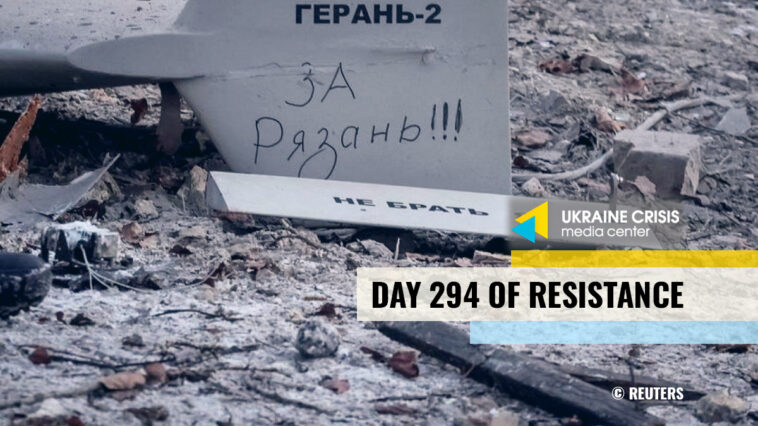Ukraine’s air defenses shoot down all 13 drones headed for Kyiv
In the early morning of Wednesday, December 14, an air raid alert was declared in the Ukrainian regions of Kyiv, Zhytomyr, and Vinnytsia. Several blasts rocked Kyiv, as the air defense systems intercepted all 13 Iranian-made drones headed toward the city.
Explosions rocked Kyiv at around 6.30 a.m. Wreckage from the intercepted drones hit an administrative building and caused minor damages to four residential buildings in the Shevchenkivskyi district. There were no casualties. Some of the drones headed for Kyiv were downed in Kyiv region. A private house was damaged in Vyshneve.
Russia attacked Kyiv with Iranian-made Shahed-136 and Shahed-131 drones. The strikes came in two waves.
Russian drone strikes on Kyiv and the region around the capital did not damage any energy facilities, national power grid operator Ukrenergo said. “Thanks to the brilliant work of the air defense forces, the energy infrastructure facilities were not damaged — all 13 drones were shot down,” Ukrenergo said on Telegram.
On December 13, Ukrenergo did not impose emergency power outages to balance the system as another unit at a nuclear power plant was back in operation, the company said.
The situation is still complicated as Ukraine’s energy grid was heavily damaged, Ukrenergo added.
Ukraine’s “brave people” receive European Parliament’s 2022 Sakharov Prize
On Wednesday, December 14, representatives of Ukraine received the European Parliament’s 2022 Sakharov Prize for Freedom of Thought on behalf of “the brave people of Ukraine”.
Ukrainian President Volodymyr Zelenskyi addressed the ceremony via a video link. Announcing the laureate several weeks earlier, European Parliament President Roberta Metsola said: “This award is for those Ukrainians fighting on the ground. For those who have been forced to flee. For those who have lost relatives and friends. For all those who stand up and fight for what they believe in. I know that the brave people of Ukraine will not give up and neither will we.”
The annual prize, named after the Soviet physicist and dissident Andrei Sakharov, was established in 1988 by the European Parliament to honor individuals and organizations defending human rights and fundamental freedoms.
Last year, the prize was awarded to jailed Russian opposition politician Aleksei Navalny. The 2020 Sakharov Prize for Freedom of Thought was awarded to the democratic opposition in Belarus, and received by Sviatlana Tsikhanouskaya on behalf of the Coordination Council. 2018 Sakharov Prize laureate Oleg Sentsov – Ukrainian film director and political prisoner in Russia at the time, was able to accept his award in person in 2019 after the release.
Ukrainian authorities discover torture chambers for children in recaptured territory
In the captured parts of Ukraine’s Kharkiv and Kherson regions, the Russian troops established torture chambers for children that “resisted”, Ukrainian Parliament’s Commissioner for Human Rights, Dmytro Lubinets said in a news conference at Media Center Ukraine – Ukrinform on Wednesday.
“Yes, that’s true. We recorded the torture of children for the first time. I thought that the bottom could not be broken after Bucha, Irpin. I personally saw two torture chambers located opposite each other in Balakliya [Kharkiv region]. One guy stayed there for 90 days. He said that he had been tortured: they cut him with a knife, heated metal and burned part of his body, several times he was taken out to be shot and they shot over his head. He heard the screams of women and men who were being tortured 24 hours a day. I thought it was there … bottom,” Lubinets said.
“No. We saw the bottom in Kherson. In one of the torture chambers, we discovered a separate cell where children were kept. People who were held in the chamber described a room next to theirs where they knew children had been held and which Russian officials referred to as the ‘children’s cell’. It was equally damp, the only difference from the conditions of the children’s cell with that of the other prisoners is they were given three thin mats to lay on. They said [the mats] were for children,” Ukrainian Parliament’s Commissioner for Human Rights proceeded.
The children were given water every other day and almost no food, Lubinets said. They also endured psychological pressure and were told by the guards that their parents had abandoned them.
One 14-year-old boy was taken to the chamber after he took a picture of Russian equipment that had been reportedly damaged. He was subjected to torture.
“Those are the children that, the Russian forces thought, resisted,” Lubinets said.




